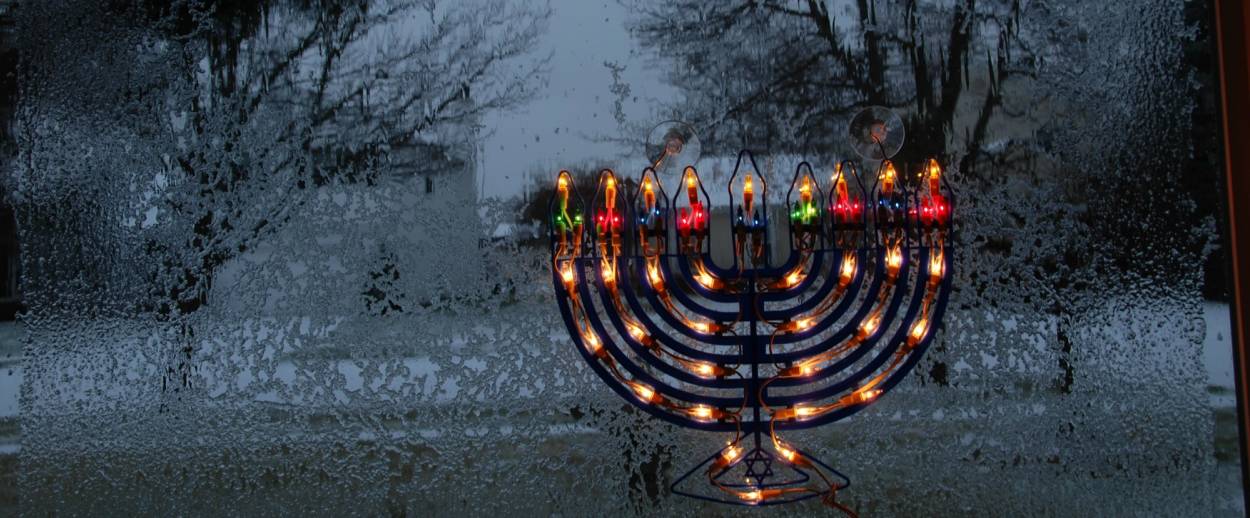Fighting the Darkness with My Electric Menorah
It may be tacky, but there’s no better way of spreading light in a time of growing anti-Semitism and fear




In 1993, in Billings, Montana, someone threw a brick through a window that displayed a child’s drawing of a menorah.
That was the year I bought an eclectic menorah.
I had always turned up my nose at them: ugly, commercial, crass, nowhere near as beautiful or meaningful as real flames. But candles burn out within an hour and I wanted the light to shine all night long—to stand with the family whose children were terrorized and with the town of Billings, which rallied against anti-Semitism as thousands hung images of menorahs in their windows.
I’d been putting a menorah in my window for years, as is the custom, and, indeed the commandment. The idea is to “proclaim the miracle of Hanukkah” to the whole world. It’s not a big miracle, no parting of the sea or anything: A one-day supply of oil lasted for eight day, so the lights could stay on in the Temple. Also, a band of Hebrew zealots stood up to the Greek Empire and won a short-lived victory.
By the way, my mother, who survived the Nazis in Europe, thought I was nuts.
In 1993, I put an electric menorah in my window as a gesture of defiance and solidarity with the Jews and non-Jews of Billings. It was also a demonstration of my faith in my own safety; my confidence that no one would throw a rock through the window. That I could count on the good will of everyone who saw it. That I was safe in America.
The electric menorah has been part of my Hanukkah ever since. It spends most of the year in a box with all the other holiday stuff: the “real” menorah that holds the candles over which we sing blessings; the dreidels used for a pointless game that is supposed to keep children occupied; a troop of silly toy wind-up walking dreidels that I can’t resist.
This year I thought about leaving the electric menorah in the box.
A few months ago, I got an invitation to attend a memorial for Jerry Rabinowitz, someone I knew in elementary school and one of the 11 Jews murdered in a Pittsburgh synagogue a year ago. Last week, a kosher store in Jersey City was shot up leaving four dead.
It gets closer all the time. In the past year, arson was attempted at the homes of rabbis in Needham and Arlington. Vandals have painted swastikas on gravestones, synagogues, and schools all over Massachusetts: Melrose, Reading, Boston, Watertown, Quincy, Sharon, Wellesley… on and on and on.
It gets dark so early now. It’s cozier and warmer when we pull down the shades. Where’s the harm in shutting out the gloom, not to mention the doom?
I know the answer to that one: The harm goes to the spirit or, if you prefer, the soul.
This is the season when people of all faiths and cultures are pushing back against the planetary darkness. We string bulbs, ignite bonfires, and light candles. And we sing.
Compared to Christmas, the Hanukkah songbook can’t hold a (wait for it) candle. But I do have a favorite, written in 1983 by Peter Yarrow, of Peter, Paul, and Mary:
Light one candle for the strength that we need
To never become our own foe
And light one candle for those who are suffering
Pain we learned so long ago
Light one candle for all we believe in
That anger not tear us apart
And light one candle to find us together
With peace as the song in our hearts
Don’t let the light go out!
It’s lasted for so many years!
Don’t let the light go out!
Let it shine through our hope and our tears
So, I plugged in my electric menorah and turned the “candle” in its socket. But for the first time, I said a little untraditional prayer of my own: for the safety of my family, for the good will of my neighbors, and most of all, for an end to bigotry and for justice to prevail.
Happy Holiday of Your Choice. And may we all live to celebrate good news in 2020.
Anita Diamant is the author of several best-selling books, including The Red Tent and, most recently, The Jewish Wedding Now.